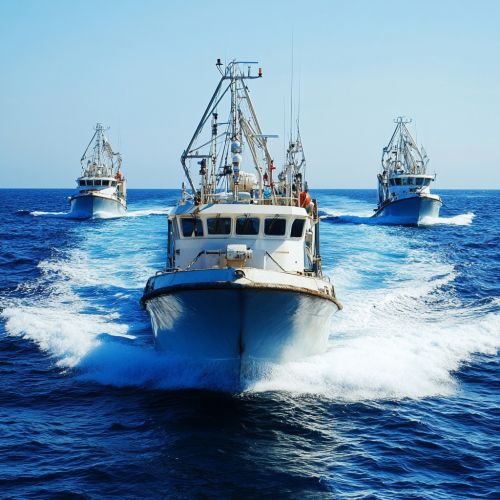Regional Fisheries Management Organizations: Difference between revisions
(Created page with "== Introduction == Regional Fisheries Management Organizations (RFMOs) are international bodies formed by countries with fishing interests in specific areas. These organizations play a crucial role in the sustainable management of fish stocks, particularly those that are highly migratory and straddle multiple jurisdictions. RFMOs are instrumental in the conservation and management of marine resources, ensuring that fishing activities are conducted responsibly and sustai...") |
No edit summary |
||
| Line 15: | Line 15: | ||
Scientific research and data collection are fundamental to the functioning of RFMOs. They rely on scientific assessments to set quotas, establish fishing seasons, and implement other management measures. The scientific committees of RFMOs work closely with national research institutions and international organizations to gather and analyze data on fish stocks and ecosystems. | Scientific research and data collection are fundamental to the functioning of RFMOs. They rely on scientific assessments to set quotas, establish fishing seasons, and implement other management measures. The scientific committees of RFMOs work closely with national research institutions and international organizations to gather and analyze data on fish stocks and ecosystems. | ||
[[Image:Detail-98999.jpg|thumb|center|Fishing vessels operating in the open ocean under clear skies.|class=only_on_mobile]] | |||
[[Image:Detail-99000.jpg|thumb|center|Fishing vessels operating in the open ocean under clear skies.|class=only_on_desktop]] | |||
== Types of RFMOs == | == Types of RFMOs == | ||
Latest revision as of 20:53, 22 October 2024
Introduction
Regional Fisheries Management Organizations (RFMOs) are international bodies formed by countries with fishing interests in specific areas. These organizations play a crucial role in the sustainable management of fish stocks, particularly those that are highly migratory and straddle multiple jurisdictions. RFMOs are instrumental in the conservation and management of marine resources, ensuring that fishing activities are conducted responsibly and sustainably.
Structure and Functioning of RFMOs
RFMOs are typically established through international agreements or treaties. They consist of member countries, which may include coastal states, distant-water fishing nations, and other stakeholders with an interest in the fisheries of a particular region. The primary function of RFMOs is to manage fish stocks in their designated areas, which often extend beyond national jurisdictions into the high seas.
Governance and Decision-Making
The governance structure of RFMOs usually comprises a commission, which is the main decision-making body, and various subsidiary bodies, such as scientific and technical committees. These committees provide scientific advice and recommendations on the status of fish stocks and the effectiveness of management measures. Decisions within RFMOs are often made by consensus, although voting mechanisms may be employed when consensus cannot be reached.
Scientific Advisory Role
Scientific research and data collection are fundamental to the functioning of RFMOs. They rely on scientific assessments to set quotas, establish fishing seasons, and implement other management measures. The scientific committees of RFMOs work closely with national research institutions and international organizations to gather and analyze data on fish stocks and ecosystems.


Types of RFMOs
RFMOs can be broadly categorized based on their geographical scope and the species they manage. Some RFMOs focus on specific species, such as tuna, while others manage a wide range of species within a particular region.
Tuna RFMOs
Tuna RFMOs are among the most prominent and include organizations such as the ICCAT, the IOTC, and the WCPFC. These organizations are responsible for managing highly migratory tuna species and related stocks across vast oceanic areas.
Non-Tuna RFMOs
Non-tuna RFMOs manage a variety of species, including demersal and pelagic fish, as well as invertebrates. Examples include the NAFO and the SEAFO. These organizations focus on the sustainable management of fish stocks that are not covered by tuna RFMOs.
Challenges and Criticisms
RFMOs face numerous challenges in fulfilling their mandates. One of the primary issues is the enforcement of management measures, particularly in areas beyond national jurisdiction. Illegal, unreported, and unregulated (IUU) fishing remains a significant problem, undermining the efforts of RFMOs to conserve fish stocks.
Compliance and Enforcement
Ensuring compliance with RFMO regulations is a complex task that requires cooperation among member states. RFMOs employ various tools to monitor and enforce compliance, including vessel monitoring systems, observer programs, and port state measures. However, the effectiveness of these tools can be limited by lack of resources and political will.
Environmental and Ecosystem Considerations
RFMOs are increasingly adopting an ecosystem-based approach to fisheries management, which considers the broader environmental impacts of fishing activities. This approach aims to minimize bycatch, protect vulnerable marine ecosystems, and address the effects of climate change on fish stocks. However, integrating ecosystem considerations into RFMO management frameworks remains a work in progress.
The Future of RFMOs
The future of RFMOs depends on their ability to adapt to changing environmental, economic, and social conditions. Strengthening the scientific basis for decision-making, enhancing compliance and enforcement mechanisms, and fostering greater cooperation among member states are essential for the continued effectiveness of RFMOs.
Technological Innovations
Advancements in technology offer new opportunities for RFMOs to improve their management practices. Satellite tracking, electronic monitoring, and data analytics can enhance the monitoring and enforcement of fishing activities, providing more accurate and timely information for decision-making.
International Cooperation
Global initiatives, such as the UN Fish Stocks Agreement, emphasize the importance of international cooperation in the management of transboundary fish stocks. RFMOs play a critical role in facilitating such cooperation, promoting the sustainable use of marine resources for the benefit of present and future generations.
